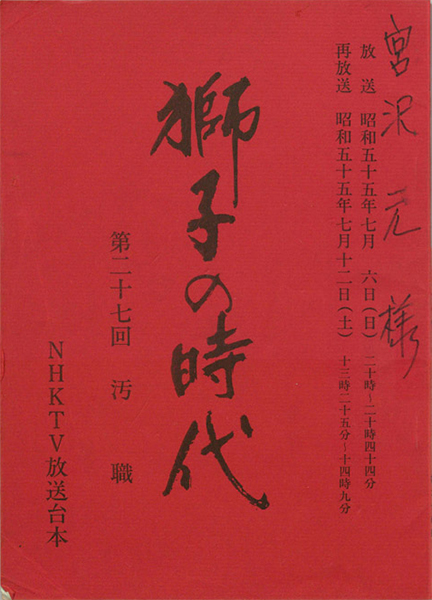Digital Script ArchivesDetail
Annual Historical Drama: Shishi no Jidai

- No.
- ST-00242
- Year
- 1980
- Broadcated
/Created by - NHK
- Scriptwriter
- Yamada Taichi
- Format
- drama seriese
- Awards
- Galaxy Award for programs highly recommended (Shinobu Otake)
- Overview
- This first ever Annual Historical Drama series is based on an original script and depicts the bright side and dark side of Japan’s modernization from the viewpoint of low ranking samurai in the Aizu and Satsuma domains. The year is 1867. Senji Hiranuma, a retainer to the lord of Aizu, and Yoshiaki Kariya, a retainer to the lord of Satsuma, first meet at the 1900 Paris Exposition. They are inspired by Western culture and civilization. After returning to Japan, the two end up being opposing forces. After being defeated in the Battle of Aizu and the Battle of Hakodate, Hiranuma wanders around the country from the Shimokita Peninsula in Aomori to Kagoshima (the Satsuma Rebellion). Ultimately, he participates in the uprising of the Chichibu Konmin (poor people’s) Party. Throughout his life on the run, the wild-natured Hiranuma clumsily adheres to the freedom and equality he has experienced first hand. Meanwhile, Kariya, who is an idealist, becomes an official of the new government after the Battle of Aizu. Under Okubo Toshimichi, he takes part in establishing the police system. After the Satsuma Rebellion he leaves his government post to draft a constitution, almost naively dedicating himself to the ideals of modernization. Most of the Annual Historical Drama series revolve around well known historical samurai commanders. In contrast, the episodes of Shishi no Jidaido not deviate from the perspective of two nameless low ranking samurai warriors and their families as well as farmers and townsfolk, depicting the upheavals from the late Edo period to early Meiji period. For example, after the flames of war subside, Senji Hiranuma’s younger sister, Chiyo, throws the following words at Kariya Yoshiaki who says that the war was for the sake of Japan: “How can you kill so many people and burn their houses when you don’t hate them? It doesn’t make sense, but I know what you have done!” While depicting familial love and romance within the context of historical upheavals, the screenwriter lets these families voice their thoughts, rather than logic, which are reiterates the reticence of farmers and short phrases of townsfolk. These words always reverberate in a dim hovel. This kind of playwriting is what made Taichi Yamada’s unique grassroot Annual Historical Drama series successful.
- Tags

